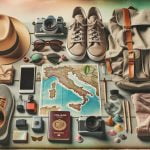Are you planning a trip to Italy? Whether you’re dreaming of exploring the ancient ruins of Rome, enjoying the tranquil beauty of Tuscany, or indulging in the delectable cuisine, there are certain must-haves for traveling to Italy that will ensure a smooth and enjoyable journey. From packing essentials to understanding cultural customs and navigating transportation, this article will cover everything you need to know before embarking on your Italian adventure.
Italy is a country rich in history, culture, and natural beauty. Its diverse landscapes, iconic landmarks, and world-renowned cuisine make it a top destination for travelers from around the globe. To make the most of your trip to this enchanting country, it’s essential to be well-prepared with the right clothing, accessories, language tools, and travel documents. Understanding Italian customs and dining etiquette is also crucial for experiencing Italy like a local.
In this comprehensive guide, we will explore the must-haves for traveling to Italy that will help you immerse yourself in all that this beautiful country has to offer. From tips on what to pack and essential language phrases to cultural insights and safety precautions, we’ve got you covered for an unforgettable journey through Italy. So get ready to experience la dolce vita as we delve into the essentials for a successful and enjoyable trip to Italy.
Packing Essentials
When packing for a trip to Italy, it’s important to consider the diverse landscapes and climates you’ll encounter. Whether you’re exploring the rolling hills of Tuscany, the bustling streets of Rome, or the picturesque Amalfi Coast, having the right clothing, footwear, and accessories is essential for a comfortable and enjoyable experience. Here are some must-haves for traveling to Italy:
- Clothing: When it comes to clothing, versatility is key. Lightweight layers are ideal for navigating Italy’s varying temperatures. Pack breathable fabrics like cotton and linen that will keep you cool in the summer months, as well as a few warmer pieces for cooler evenings. Don’t forget to bring a light waterproof jacket or coat for unexpected showers.
- Footwear: Comfortable walking shoes are a non-negotiable item when visiting Italy. With cobblestone streets and uneven terrain in many cities and historic sites, sturdy yet stylish walking shoes or sneakers are a must-have. If you plan on visiting coastal areas or beaches, don’t forget to pack a pair of sandals or flip-flops as well.
- Accessories: Sunglasses, a wide-brimmed hat, and sunscreen are essential items for protecting yourself from the intense Italian sun. Additionally, consider bringing a small crossbody bag or backpack to keep your belongings secure while exploring busy city centers and tourist attractions.
By packing these essentials, you’ll be well-prepared to explore all that Italy has to offer while staying comfortable and stylish throughout your trip.
Cultural Must-Haves
When traveling to Italy, it’s essential to familiarize yourself with the country’s customs, traditions, and etiquette to ensure a positive and respectful experience. Here are some cultural must-haves for navigating Italian society:
1. Greetings: Italians typically greet each other with a kiss on the cheek or a handshake. It’s important to follow their lead when meeting new people or greeting friends and family.
2. Dress Code: In Italy, fashion is highly valued, so it’s important to dress neatly and conservatively, especially when visiting religious sites. Avoid wearing beachwear or overly casual clothing in urban areas.
3. Dining Etiquette: When dining in Italy, remember that meals are a social event and should be enjoyed leisurely. Always wait for the host to start eating before you begin your meal, and be sure to use proper dining utensils.
4. Gestures and Body Language: Italians are known for their expressive gestures and body language. While talking, they often use their hands to emphasize points or convey emotions. It’s also essential to maintain eye contact during conversations as a sign of respect.
Understanding these cultural nuances must haves for traveling to Italy will not only enhance your travel experience but also show respect for the local customs and traditions of this beautiful country.
Language Tools
When traveling to Italy, it is essential to have a basic understanding of the Italian language. While many Italians speak English, especially in touristy areas, knowing some useful phrases can greatly enhance your travel experience. Simple greetings such as “Buongiorno” (good morning), “Grazie” (thank you), and “Parla inglese?” (do you speak English?) can go a long way in establishing rapport with locals.
In addition to learning a few basic phrases, travelers to Italy can benefit from using translation apps. These tools can help bridge the gap between languages and provide instant translations for menus, signs, or conversations. Popular options include Google Translate, Duolingo, and iTranslate. Some apps even offer offline capabilities, which are particularly useful in areas with limited internet access.
For those interested in diving deeper into the Italian language, there are numerous resources available for language learning. Online platforms like Babbel and Rosetta Stone offer comprehensive Italian courses that cater to different proficiency levels. Additionally, travelers can consider enrolling in language classes or finding a tutor for personalized instruction.
Overall, having some grasp of Italian language and access to translation tools can significantly enhance the travel experience in Italy. Whether it’s ordering food at a local trattoria or asking for directions on the streets of Rome, these language tools are indispensable for navigating the country.
| Useful Italian Phrases | Translation Apps | Language Learning Resources |
|---|---|---|
| Buongiorno – Good morning | Google Translate | Babbel Italian Courses |
| Grazie – Thank you | Duolingo | Rosetta Stone Italian Program |
Travel Documents
When traveling to Italy, it is essential to have all the necessary travel documents in order to ensure a smooth and hassle-free trip. The most important document you must have is your passport. Make sure that your passport is valid for at least six months beyond your planned date of departure from Italy. Additionally, if you are not a citizen of a European Union country, you will need to check whether you require a visa for entry into Italy.
In addition to your passport and visa, it is highly recommended to purchase travel insurance before embarking on your trip to Italy. Travel insurance can provide coverage for medical expenses, trip cancellations, lost luggage, and other unexpected events that may disrupt your travel plans. It is also important to carry important contact information with you, including the address and phone number of the nearest embassy or consulate in case of emergencies.
Finally, it is wise to make copies of all your important travel documents, such as your passport, visa, travel insurance policy, and any other pertinent information. Keep these copies separately from the originals while traveling and leave an additional set of copies with a trusted person back home in case of any unforeseen circumstances.
| Document | Importance |
|---|---|
| Passport | Essential for entry into Italy |
| Visa | Verify if needed based on nationality |
| Travel Insurance | Coverage for medical expenses and trip disruptions |
| Contact Information | In case of emergencies or unforeseen circumstances |
Cuisine and Dining
When traveling to Italy, experiencing the world-renowned cuisine is an essential part of the trip. From iconic dishes to regional specialties, Italian food is adored worldwide for its delicious flavors and fresh ingredients. Here are some must-try Italian dishes that you must sample during your visit:
Must-Try Dishes
One of the most famous Italian dishes is pizza, which originated in Naples. Whether you opt for a classic Margherita or try a unique local variation, such as the Neapolitan or Roman-style pizza, sampling authentic Italian pizza is a must. Additionally, pasta lovers will delight in trying different pasta shapes and sauces, including spaghetti carbonara, fettuccine alfredo, and gnocchi. It’s also essential to savor traditional antipasti like bruschetta, prosciutto e melone (prosciutto with melon), and caprese salad.
Dining Etiquette
Italian dining is a leisurely affair meant to be savored and enjoyed with good company. When dining out at restaurants, it’s customary to greet the staff with “buongiorno” (good morning) or “buonasera” (good evening) upon entering.
Additionally, it is polite to wait for the host to seat you rather than choosing your own table. In formal settings, it’s customary to keep your hands above the table at all times while dining and to never ask for grated cheese on seafood-based dishes or pasta dishes with fish.
Tips for Enjoying Italian Cuisine
To fully enjoy Italian cuisine during your travels, consider booking a food tour or cooking class to learn about local ingredients and culinary traditions firsthand. Additionally, don’t be afraid to eat like a local by enjoying long lunches and dinners filled with multiple courses and good conversation.
Lastly, remember that tipping in Italy is not as common as it is in other countries; instead of calculating a standard 15-20% gratuity when dining out, simply round up the bill if you wish to leave a tip. By embracing these culinary experiences and traditions, travelers can savor every moment of their dining experiences in Italy.
By immersing yourself in Italian cuisine and following proper dining etiquette while exploring this beautiful country, you can truly appreciate Italy’s rich culinary heritage and enjoy an unforgettable gastronomic journey.
Transportation Essentials
When traveling to Italy, it’s important to plan for how you will navigate the country’s cities and countryside. Whether you prefer public transportation or renting a car, understanding the available options and necessary logistics will help ensure a smooth and enjoyable trip.
Public Transportation
Italy boasts an extensive public transportation system, making it easy to get around without a car. Major cities like Rome, Milan, and Florence have efficient metro systems, while buses and trams provide additional options for navigating urban areas. Visitors can also take advantage of Italy’s high-speed trains, which connect major cities and offer a convenient way to travel between regions.
Purchasing Tickets
When using public transportation in Italy, it’s essential to familiarize yourself with ticketing procedures. Many cities offer integrated ticketing systems that allow passengers to use the same ticket for multiple modes of transport within a specified time frame. It’s also important to validate tickets before boarding trains or buses, as failure to do so may result in fines.
Renting a Car
For travelers who prefer the flexibility of having their own vehicle, renting a car is a popular option for exploring Italy’s countryside and smaller towns. However, it’s important to be aware of driving regulations and road signs, as well as the requirement for an International Driving Permit if your license is not in Italian. Additionally, parking in major cities can be challenging and expensive, so careful planning is necessary.
By familiarizing yourself with public transportation options and potential challenges when renting a car in Italy, you’ll be well-prepared for experiencing all that this beautiful country has to offer. Incorporating these transportation essentials into your travel plans will help ensure that you can navigate Italy with ease and enjoy everything from its bustling cities to its picturesque rural landscapes.
Safety and Health
When traveling to Italy, it is essential to prioritize safety and health to ensure a smooth and enjoyable trip. Whether exploring the bustling cities or the serene countryside, being prepared with the necessary precautions can make all the difference. In this section, we will discuss important tips for staying safe and healthy while traveling in Italy, including emergency contacts and necessary medications.
One of the most important aspects of staying safe while in Italy is being aware of your surroundings and taking precautions to avoid theft and scams. It is advisable to keep a close eye on your belongings in crowded areas, such as tourist attractions and public transportation hubs.
Additionally, it is recommended to carry minimal cash and use secure forms of payment when possible. Familiarizing yourself with emergency contact information, including local authorities and medical services, is also crucial in case of any unforeseen circumstances.
In terms of health, it is important to be mindful of food and water safety while traveling in Italy. While the cuisine is undoubtedly one of the highlights of any trip to Italy, it is recommended to consume food from reputable establishments and drink bottled water when possible.
It is also advisable to have travel insurance that covers medical expenses in case of illness or injury during your trip. Bringing along any necessary medications and having access to a list of local pharmacies can provide peace of mind in case of any health-related concerns during your travels.
Overall, prioritizing safety and health while traveling in Italy should be at the forefront of every traveler’s mind. By being prepared with emergency contacts, taking precautions against theft and scams, and maintaining good health practices, visitors can fully enjoy all that this beautiful country has to offer without worrying about unnecessary mishaps.
Conclusion
In conclusion, a trip to Italy can be an unforgettable experience filled with rich culture, stunning landscapes, delicious cuisine, and warm hospitality. To ensure a smooth and enjoyable journey, it is important to bring along the must-haves for traveling to Italy. From packing essentials like versatile clothing and comfortable footwear to understanding Italian customs and traditions, being prepared with the right items and knowledge will greatly enhance your travel experience.
Additionally, having language tools such as useful Italian phrases and translation apps can help navigate the country more easily and interact with locals. It is also crucial to have all necessary travel documents in order, including passport, visa, travel insurance, and important contact information. Not to mention the importance of savoring must-try Italian dishes and understanding dining etiquette while enjoying the world-renowned cuisine.
As you prepare for your trip to Italy, it’s essential to keep in mind transportation essentials for getting around cities and countryside. Finally, safety measures such as emergency contacts and necessary medications should not be overlooked. With these key must-haves for traveling to Italy in mind, you can look forward to an exciting adventure exploring this beautiful country, creating lasting memories along the way. Buon viaggio.
Frequently Asked Questions
What Are Must Haves When Traveling to Italy?
When traveling to Italy, there are a few must-haves to consider. Comfortable walking shoes are essential, as you’ll likely be exploring historic sites and cobblestone streets.
Additionally, a universal adapter for your electronics is crucial, as Italy uses different outlets than the US. It’s also recommended to have a reliable travel guide or map of the cities you plan to visit.
What Am I Forgetting to Pack for Italy?
When preparing for a trip to Italy, it’s easy to forget some important items. Sunscreen is often overlooked but essential, especially if you plan on visiting coastal areas or spending time outdoors.
Another commonly forgotten item is a reusable water bottle – staying hydrated while sightseeing is vital. And don’t forget to pack some dressier outfits for evenings out at restaurants or shows.
What Do You Need to Go to Italy?
To travel to Italy, US citizens need a valid passport that doesn’t expire within six months of their trip’s end date. While a visa isn’t required for short tourist visits, travelers should have travel insurance for medical emergencies and unexpected trip cancellations.
It’s advisable to check the specific entry requirements before traveling, as they can vary depending on your citizenship and the duration of your stay.

I’m a passionate traveler, writer, and Italophile. My fascination with Italy’s history, art, and culture has led me on countless adventures across the Italian landscape. Through “I Live Italy,” I share my love for this extraordinary country and aims to inspire others to explore its boundless beauty.





